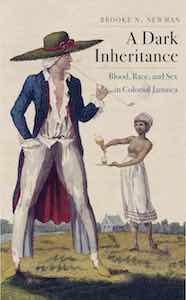Today, The Junto features a Q&A with Brooke Newman,  author of A Dark Inheritance: Blood, Race, and Sex in Colonial Jamaica (Yale, 2018), which was a finalist for the Gilder Lehrman Center’s 2019 Frederick Douglass Book Prize for the best work in English on slavery, resistance, and/or abolition. Her research focuses on the intersections of race, sexuality, and gender in the context of slavery and abolition in the British empire, focusing on the Caribbean. Newman is an Associate Professor of History at Virginia Commonwealth University, where she is also Interim Director of the Humanities Research Center. Look for a review of A Dark Inheritance later this spring.
author of A Dark Inheritance: Blood, Race, and Sex in Colonial Jamaica (Yale, 2018), which was a finalist for the Gilder Lehrman Center’s 2019 Frederick Douglass Book Prize for the best work in English on slavery, resistance, and/or abolition. Her research focuses on the intersections of race, sexuality, and gender in the context of slavery and abolition in the British empire, focusing on the Caribbean. Newman is an Associate Professor of History at Virginia Commonwealth University, where she is also Interim Director of the Humanities Research Center. Look for a review of A Dark Inheritance later this spring.
Author Archives: Lindsay Keiter
Review: Parisot, How America Became Capitalist
James Parisot, How America Became Capitalist: Imperial Expansion and the Conquest of the West (London: Pluto Press, 2019).
 In just under 200 pages, Parisot traces the intertwined expansion of white settler colonialism in British North America and the transition to capitalism from the seventeenth through the nineteenth centuries. A historical sociologist, Parisot synthesizes a great deal of historical scholarship in order to offer a framework for “how a society with capitalism became a capitalist society” while embracing “multi-linear complexity” (2, 6). He argues that both capitalist and “not-so-capitalist” relations drove American Indian dispossession and westward imperial expansion. Inspired by the work of W.E.B. Du Bois, Parisot’s framework seeks to take race and gender into account “to explain capitalism, imperialism, and empire as processes reaching down into daily life and stretching back to broad historical structures which they in turn co-shape” (16). Continue reading
In just under 200 pages, Parisot traces the intertwined expansion of white settler colonialism in British North America and the transition to capitalism from the seventeenth through the nineteenth centuries. A historical sociologist, Parisot synthesizes a great deal of historical scholarship in order to offer a framework for “how a society with capitalism became a capitalist society” while embracing “multi-linear complexity” (2, 6). He argues that both capitalist and “not-so-capitalist” relations drove American Indian dispossession and westward imperial expansion. Inspired by the work of W.E.B. Du Bois, Parisot’s framework seeks to take race and gender into account “to explain capitalism, imperialism, and empire as processes reaching down into daily life and stretching back to broad historical structures which they in turn co-shape” (16). Continue reading
Making the Personal Historical: Reflections on Pregnancy and Birth

“A Lady & Children,” 1780 mezzotint, the British Museum.
Human reproduction is simultaneously unchanged and radically different over time and across cultures. This paradox has preoccupied me for over a year as I carried and gave birth to my first child one year ago today, and as I watched my sister follow the same path soon after. Throughout my pregnancy, delivery, and now early motherhood, I’ve found myself thinking often long-dead women and pondering how vastly different our experiences of the same condition must be.
Pregnancy and birth generate intense feelings. Most parents experience joy, hope, and fear. As a historian, I regularly identify with the women I encounter in the archive. The empathy born of our shared biological and emotional experiences generated two additional emotions that most new parents may not: gratitude, on the one hand, and anger on the other. Continue reading